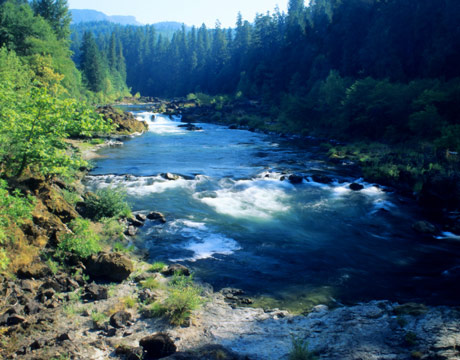Putting Water Back Into the Deschutes River in Oregon

Out here on the Oregon High Desert local businesses and environmental conservation groups are partnering to conserve water, improve the fish and wildlife habitat and make the heart of the region's Deschutes River more attractive to recreation and tourism.
The Deschutes River Conservancy's (DRC) popular ten year old effort to provide incentives to landowners to conserve Deschutes River irrigation water by "leasing" their paid for but otherwise wasted water in order to leave that water in the river received a major boost this past month when Central Oregon's largest brewery, The Deschutes Brewery, announced its partnership with the DRC and local irrigation districts to return an estimated one billion gallons of water to the Middle Deschutes River each year. Water that otherwise would be diverted to the irrigation system to be used to irrigate will instead remain in the river, with noticible improvement on fish and wildlife habitat as well as recreational opportunities along the river between Bend and Lake Billy Chinook.
DRC Director Tod Heisler announced the brewery has agreed to contribute $25,000 a year to lease water rights from landowners who otherwise have no use for water they are entitled to by their water rights. Oregon water law stands on a "use it or lose it" principle, meaning landowners with water rights must either use that water even if they have no wish to raise crops or livestock, or forfeit those water rights. As McMansions continue to sprawl across The High Desert many landowners find themselves holding water rights they have no use for, but are never-the-less unwilling to sell or forfeit. "This is not an insignificant investment," said Heisler, it is "in fact something very big."
The contribution will return nine cubic feet per second (cf/s) of water back into the Middle Deschutes, which now flows at about 160 cf/s, and the conservancy hopes that through conservation and rights acquisition to increase flows to 200 cf/s. Raising the flow will produce "measurable and visible conditions for fish and other wildlife," said conservancy spokesperson Bea Armstrong, as well as making "it possible to float the river in sections where now even a kayak couldn't go, boosting recreation and tourism by making the river more attractive to anglers, rafters and other users."
The Deschutes Brewery had originally set its sights somewhat lower when considering the contribution, originally considering a donation equal to the amount of water used in the brewing and supply process - it takes about four gallons of water to produce one gallon of beer - but found that to be not all that much relative to how much has been removed from the Deschutes over the years. Deschutes produces around 250,000 thirty-one gallon barrels a year, leading their community involvement team to settle on a "nice round number that would make a noticible difference in the Middle Deschutes," says brewery Chief Operating Officer Michael LaLonde: "one billion gallons," or roughly fourteen times the amount of water used by the brewer's facilities, suppliers and supply chain.
One billion gallons of water is equal to sixteen hundred olympic swimming pools, twenty-seven hundred football fields under a foot of water, eighteen million 55 gallon rain barrels, twenty-four million barrels of crude oil, seventy-five million kegs and almost two billion six packs of beer.
Last week I interviewed Deschutes Brewery founder and CEO Gary Fish on my show Breakfast in Bend at KPOV, High Desert Community Radio. He considers the deal a permanent investment in the health and future of the river. "At this point we see no end to our commitment," says Fish, "the future is always uncertain, but this is a long-term commitment on our part. These are issues important to our time, issues we can impact, can do something about, and our group within the company that is responsible for making these decisions thought this would fit perfectly with who we are and what we do. The fact that we can look out the window and see the results is for us extremely cool. Water is what defines us in the West, to a large extent, to say nothing of the fact it's the most significant ingredient we use."
"It's a measure of who we are as a member of the community."




